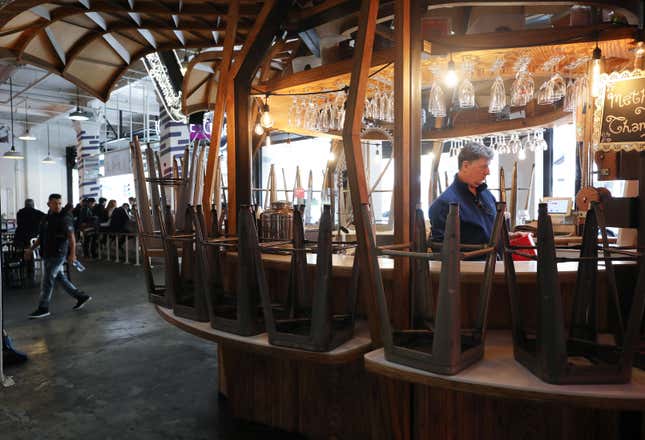
As confirmed cases of COVID-19, the disease caused by the novel coronavirus, continue to increase across the U.S., governors and mayors have mandated major closures of schools and businesses, shutting down gyms, restaurants, movie theaters, and prohibiting public gatherings of more than 50 people.
Starting Tuesday, all bars, restaurants and cafes in New York City and Los Angeles will be limited to takeout and delivery. All nightclubs, movie theaters, and entertainment venues will also be closed across New Jersey, Connecticut, and New York to prevent further spread of the COVID-19.
“We’re going into a full crisis footing,” New York City Mayor Bill de Blasio said on Saturday, according to the Intelligencer. “This is a wartime dynamic.” The next day, the mayor announced the closure of the city’s public schools, a measure he had previously said he would try to avoid.
This wartime analogy was also invoked by Oregon Gov. Kate Brown and the president of Massachusetts General Hospital in recent days.
Similar mandates for “non-essential businesses,” like restaurants and casinos, have come down across the rest of California, Illinois, Ohio, Washington and most recently, Maryland. Massachusetts, according to Eater. D.C. announced all nightclubs would be shuttered, and banned bar seating at restaurants. In Las Vegas, major casinos announced they’d be closing their casinos and resorts by Tuesday, including MGM Grand and Wynn Resorts.
Countries like Italy, France, and Spain have issued similar lockdowns of businesses and schools. In the absence of widespread testing and surveillance, as has been the case in South Korea, efforts to curb the spread of the coronavirus in the U.S. have focused on self-quarantining and closures.
But the widespread shuttering of businesses and schools will test the durability country’s social safety net and its infrastructure.
These complications are most apparent in decisions around school closures. In New York City, text alerts from city government announced that students are expected to begin remote digital learning starting next Monday, but grab-and-go meals will be provided for student pickup this week. Supervision for children of healthcare workers, first responders, and transit workers won’t begin until next Monday. Care will also be provided for the city’s most vulnerable children, including those who are homeless and whose families live below the poverty line, reports the New York Daily News.
This will be challenging in the city: 750,000 low-income students attend New York Public Schools (for perspective, that’s the total number of students who attend Los Angeles Unified School District and San Diego, combined). Well over 100,000 kids are homeless, and about 20 percent of children attending public schools have special needs, reports the New York Times.
To help the transition to online learning, the city’s Education Department will have to rely on private sector help. From the New York Daily News:
Education Department officials said they’re working with Apple to purchase and give out up to 300,000 iPads. T-Mobile is going to work with city officials to help with internet access.
The shift leaves scores of questions for teachers and students, especially for high school seniors set to graduate in the spring and for students scheduled to take state exams. State officials are applying for a waiver from the federal government to postpone the exams.
In school districts across the country, concerns remain about the short and longterm effects of closures. Public health experts say schools need to be closed for the duration of the virus in order to be effective—a timeline that could extend for months. Closures could also be rendered ineffective if groups of students continue to gather outside of their homes. Once school does resume, students without adequate educational resources or support at home may find themselves lagging far behind their peers.
As COVID-19 makes the possibility of a global recession all but inevitable, some public officials and energy companies have called on or installed policies to help protect those who cannot pay their most essential bills. Los Angeles Mayor Eric Garcetti issued a moratorium on eviction notices this weekend, and utility companies across the country, including Con Ed, have announced they won’t stop service for anyone who can’t make payments.
Still, public officials say more needs to be done to help Americans weather the crisis. Mayor Garcetti and others have called on the federal government to help with paid sick and family leave, additional SNAP funding for those who need food stamps, and ensuring speedier responses for unemployment checks.
As new public safety guidelines and protocols continue to be developed, officials have warned it could be a long time before life goes back to “normal” for Americans.
“I fear that this crisis is going to start to crescendo through April, May before it ever gets better,” de Blasio said on MSNBC’s Morning Joe on Monday. “It’s going to get a lot worse before it gets better.”

